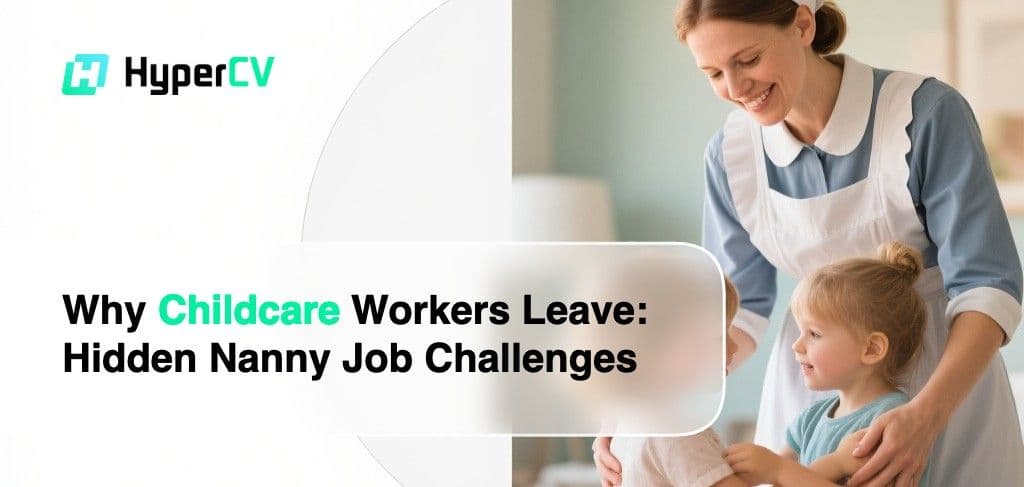Why Childcare Workers Leave: Hidden Nanny Job Challenges

The childcare industry has a big problem. Many people start working as nannies with high hopes, but end up leaving the field completely. Recent discussions among childcare workers reveal troubling patterns that explain why so many professionals abandon their careers.
The Reality Behind the Dream Job
Many people think nannying is just advanced babysitting. They're wrong. Today's childcare professionals handle far more than child supervision. A typical nanny often works 50+ hours per week managing doctor appointments, scheduling activities, coordinating drop-offs and pick-ups, meal planning, and even hiring household staff.
According to research on nanny experiences, many nannies working for wealthy families describe feeling overwhelmed by unrealistic expectations. One former professional shared their experience: "I was making doctor appointments, hiring and firing housekeepers, scheduling and executing all activities for the children... grocery shopping and meal planning, the whole shebang for an affluent family."
When Families Cross Professional Boundaries
Childcare workers often find themselves caught in family drama they never signed up for. Many report being present during:
- Marital conflicts and screaming matches
- Family crises including affairs and separations
- Personal emergencies from births to deaths
- Financial disputes between spouses
These situations put childcare workers in impossible positions. They're expected to remain professional while being emotionally invested in the family's wellbeing. As highlighted in "The Bad Nanny Wars", toxic dynamics between families and nannies can create hostile work environments that affect both job satisfaction and child safety.
The Servant Mentality Problem
Many families treat their childcare workers more like household servants than professional caregivers. This creates several issues:
Unrealistic Expectations: Parents often expect nannies to clean up after adults, manage household tasks unrelated to childcare, and be available at all hours.
Emotional Labor: Childcare workers are expected to provide emotional support to parents while managing their own professional stress.
Boundary Violations: Many families struggle to maintain appropriate employer-employee relationships.
Why Good Families Can't Keep Nannies
Interestingly, the turnover problem creates a cycle that hurts everyone. Here's how it works:
| Good Families | Bad Families |
|---|---|
| Keep nannies for years | Constantly hiring new staff |
| Rarely need to hire | Always posting job openings |
| Build long-term relationships | Create negative experiences |
This means most available positions come from problematic families. Good families with stable childcare arrangements rarely need new staff, so job seekers mainly encounter the worst employers.
The Financial Reality
Research shows that the childcare industry faces serious workforce challenges due to its inability to pay workers fairly. The biggest issue is the lack of ability to pay the workforce competitively. Literature suggests that childcare has always suffered from low wages and poor benefits.
Despite the high level of responsibility, many childcare workers report being underpaid for their actual duties. Parents sometimes treat professional childcare as a "hobby" rather than a legitimate career, questioning rates and expecting services beyond the agreed scope.
One childcare professional noted: "The weirdest part was how parents thought it was a hobby. 'Why are you charging so much?' As if I don't have bills to pay or food to buy."
Losing Your Identity in the Job
Perhaps the most damaging aspect of private childcare work is how it affects the worker's sense of self. Many report their identity becoming "enmeshed" with the families they serve.
"It's so easy to lose yourself in it," explained one former nanny. "The nanny's identity becomes enmeshed in the families because they are the center of your world... It feels so good to finally be the star in my own life."
The Emotional Toll
Childcare workers often develop deep bonds with the children they care for, making departure emotionally devastating. Unlike teachers who see students move on naturally, nannies must leave children they've helped raise from infancy.
"Loving kids you don't get to keep remains one of the most challenging things I've ever dealt with professionally," shared one former childcare worker.

Why the Industry Struggles
The childcare field faces several structural problems:
- High turnover among quality professionals
- Toxic workplace cultures in many private settings
- Lack of professional boundaries and respect
- Inadequate compensation for actual responsibilities
- Limited career advancement opportunities
According to research on family childcare challenges, providers often encounter toxic family dynamics that complicate their roles, leading to stress and burnout. The need for better support systems and strategies is crucial for improving working conditions.
Making Childcare Work Better
For families considering hiring childcare workers, success requires:
Clear Boundaries: Define job responsibilities explicitly and stick to them.
Professional Respect: Treat childcare workers as skilled professionals, not household help.
Fair Compensation: Pay appropriately for the level of responsibility and expertise required.
Personal Space: Avoid involving childcare workers in family drama and personal issues.
Experts suggest that recognizing and managing toxic behaviors is essential for maintaining a healthy work environment in childcare settings.
Moving Forward in Your Career
If you're considering leaving childcare or any challenging field, remember that your experience has value. The skills developed in childcare - organization, crisis management, multitasking, and emotional intelligence - transfer to many other careers.
Many former childcare workers successfully transition to education, healthcare, business management, and social services. The key is highlighting your transferable skills effectively.
Ready to make a career change? A professional resume can help you showcase your childcare experience in ways that appeal to new industries. Consider using HyperCV to create a compelling resume that highlights your unique skills and experiences. With the right presentation, your childcare background can open doors to exciting new opportunities that offer better work-life balance and professional growth.
The childcare industry needs reform, but individual workers shouldn't sacrifice their wellbeing waiting for change. Sometimes the best decision is moving toward a career that truly values your contributions.